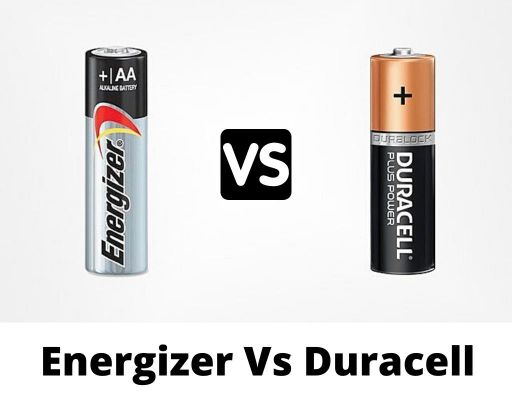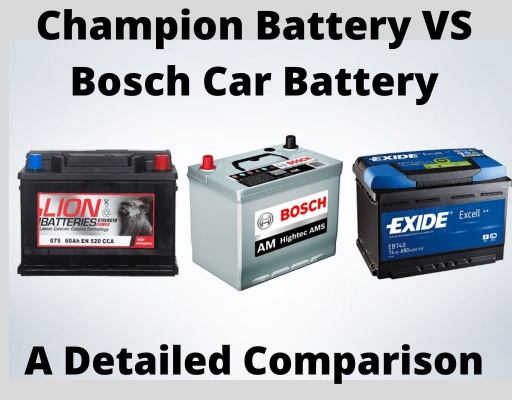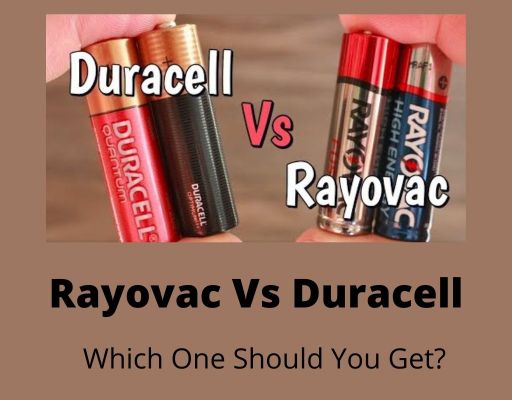Alkaline batteries are hailed in households for their affordable pricing and better runtime. In this domain, a detailed Rayovac High Energy vs Energizer Max is overdue. Which one should you buy?
According to selling price data, Rayovac High Energy is the clear winner. But you must consider other factors such as performance, shelf life, durability, and reliability.
In this article, I have talked about all of those with enough data so that you can have a clear overview of the two alkaline battery series.
Rayovac High Energy Vs Energizer Max: Quick Comparison Table
Before you start reading the main discussion part, have a look at the comparison table below for a better understanding.
| Features | Rayovac High Energy | Energizer Max |
| Runtime | Slightly more than Energizer Max | Slightly less than Rayovac High Energy |
| Cell Chemistry | Zinc-Manganese Dioxide (Zn/MnO2) | Zinc-Manganese Dioxide (Zn/MnO2) |
| Weight | Slightly less than Energizer Max | Slightly more than Rayovac High Energy |
| Operating Temp. | -30°C to 55°C | -18°C to 55°C |
| Shelf Life | 5 years for 9V; 10 years for others | 5 years for 9V; 10 years for others |
| Cost | Slightly less than Energizer Max | Slightly more than Rayovac High Energy |
| Reliable | Yes | Yes |
| Case Material | Steel for 9V; Plastic for Others | Steel for 9V; Plastic for Others |
Performance and Runtime
Following the ANSI standards, the BatterySavers team conducted a test comparing the alkaline battery performance of several brands.
It included Rayovac, Energizer, Duracell, and Eveready. Among them, Rayovac outperformed other brands.
Regarding Rayovac vs Energizer, the difference is not that much. They used similar flashlights and D-size batteries from each mentioned brand.
In the end, Energizer lasted for 22 hours and 15 minutes whereas Rayovac lasted for a whopping 24 hours and 30 minutes.
Here, the clear winner is the Rayovac High Energy battery series but it is not the only criteria you should consider before choosing one finally.
Cell Composition
As all of the concerned models of batteries in this article are alkaline, their cell chemistry is the same too.
I have read the technical data sheet of AA, AAA, C, D, and 9V batteries from both series to confirm this statement.
The cells don’t use any harmful components such as mercury during production making them safe for everyday uses and the environment.
Weight
The overall weight of all batteries in the High Energy and Max series is slightly higher in the Energizer brand.
More weight typically means more capacity and longer runtime.
But the difference in their weight data is so minimal that it seems like other parts of the body that is not related to the capacity are responsible.
Operating Temperature
There is a standard range of the OT (operating temperature) for these batteries. Both brands follow that.
Nonetheless, there is a difference between them. High Energy batteries can operate from -30°C up to 55°C or -20° F to 130° F.
On the other hand, Max batteries can operate from -18°C up to 55°C or 0°F to 130°F.
You can notice that the upper limit of the range is the same. The lower limit doesn’t matter much because most of the applications don’t need that.
Still, if you have to run a device that has to operate under -18°C, you have to choose the Rayovac High Energy series.
Shelf Life
9V batteries from both brands can hold their voltage level for up to 5 years if you store them at 21°C.
And, for AA, AAA, C, and D size batteries, you can expect a shelf life of up to 10 years stored at 21°C.
Reliability
I have read lots of customer reviews regarding High Energy and Max batteries. Most of them show positive feedback.
However, some of the customers are not happy with the runtime of these batteries. This problem can occur for various reasons.
If the electronic device gets faulty and leaks charge, it can drain the battery faster than expected.
Other complaints mention not getting the full count as listed on Amazon. For example, one customer got 11 batteries whereas he/she paid for 12.
So, those are not the faults of the manufacturer. You can trust both brands.
Both of them market their batteries with a no-leakage guarantee. For Energizer, you can expect no leaks for up to 2 years.
Rayovac promises no exact expiry date but you can expect something similar to Energizer.
Cost
Here, I’m going to list the batteries sold on Amazon, and compare the prices of the similar count.
AA-size
Here, Rayovac costs 0.66 per count, and Energizer costs 0.84 per count.
AAA-size
Here, Rayovac costs 0.68 per count, and Energizer costs 0.75 per count.
C-size
Here, Rayovac costs 1.56 per count, and Energizer costs 1.92 per count.
D-size
Here, Rayovac costs 1.32 per count, and Energizer costs 1.63 per count.
9V
Here, Rayovac costs 2.11 per count, and Energizer costs 2.62 per count.
I think that you have got a clear picture here. Energizer Max batteries cost slightly higher than the Rayovac High Energy series.
So, the winner is again Rayovac.
Durability
I have seen no complaints regarding the durability of these batteries. Both Energizer and Rayovac use premium materials and cutting-edge technology to manufacture them.
So, these batteries don’t leak easily. The 9V batteries from both brands have steel jackets, and other types have plastic jackets.
The metal used to make the terminals are rust-proof in ideal conditions. Don’t keep them in contact with water, and you have nothing to worry about.
Warranty
Unfortunately, there are no warranties regarding single-use AA, AAA, C, D, and 9V alkaline batteries.
Some eCommerce stores of physical shops have their own return policies. So, if there is any manufacturing fault, you can get a full refund or replacement.
Rayovac High Energy or Energizer Max: Which One to Choose?
Considering price, performance, and other parameters, I think that Rayovac has the upper hand over Energizer here.
Nevertheless, please don’t think that the statement is true for all other series of these brands.
I am only talking about High Energy and Energizer Max series here.
Declaring Rayovac as the winner doesn’t mean that choosing Energizer will be a bad choice.
As we are talking about two very popular and top brands in the industry, you can choose any of them without regretting them later.
Frequently Asked Questions (FAQs):
u003cstrongu003eWhich is better Rayovac or Energizer?u003c/strongu003e
Rayovac is better in comparison with Energizer.
u003cstrongu003eWhich lasts longer Rayovac or Energizer?u003c/strongu003e
Rayovac lasts longer than Energizer.
u003cstrongu003eAre Rayovac and Energizer the same?u003c/strongu003e
No, but they are owned by the same company.
u003cstrongu003eWho owns Rayovac?u003c/strongu003e
Rayovac owns Energizer.
u003cstrongu003eAre Rayovac batteries made in the USA?u003c/strongu003e
Yes
u003cstrongu003eAre Energizer batteries made in the USA?u003c/strongu003e
Yes
Conclusion
In this Rayovac High Energy Vs Energizer Max comparison, I have included ANSI standard test to show the real-life performance difference between them.
Keeping aside the similarities they have in several parameters, you have seen that Rayovac aces Energizer by a slight margin.
If you have a brand preference, you can choose any of them without hesitating. But my personal favorite here is Rayovac High Energy.



